
eXistenZ
Canada, 1999, 97 minutes, Colour.
Jennifer Jason Leigh, Jude Law, Ian Holm, Willem Dafoe, Don Mc Kellar, Callum Keith Rennie, Christopher Eggleston, Sarah Polly.
Directed by David Cronenberg.
David Cronenberg had shown films of psychology and biomedical experimentation in Videodrome and Dead Ringers. It was also a theme that fascinated him in some of his early horror films including Shivers, The Brood, Rabid.
Here he takes the interests in biomedical ethics and links them with computer games and technology. Part of the fascination of Existenz is the fact that it is playing games, biomedical games – using technology and putting people into an artificial world akin to that of The Matrix. It is difficult to know what is fantasy and what is reality, especially as there are continual unmaskings – even at the end when everything seems to be resolved, it is difficult to know whether Allegra and Ted are true terrorists and who is the real Allegra and who the real Ted?
Jennifer Jason Leigh suits the role of Allegra very well, retiring on the one hand, action heroine on the other, a complex character. Jude Law offers initial naivety but rises to the occasion as an existential hero. There are interesting supporting roles played by Ian Holm as the inventor and by Willem Dafoe as the service station attendant with the power to make bioports.
Later David Cronenberg was to make Spider, a 1950s equivalent of being involved in aspects of an Existenz game. Then, with his interest in on-screen violence and violence in society he made the excellent drama, A History of Violence.
1. The vision of David Cronenberg, a dark vision of society, technology developments, violence? Yet the playful games even during sinister violence?
2. The visual style of the film, lighting and colour, darkness, a sinister atmosphere, a cold atmosphere? The world of technology? The world of film and visual fantasy with creatures? A depersonalised world? The audio effect of the film, especially during the heightened aspects of the games? The musical score?
3. The title and its existential overtones: to be, to live, to die? The philosophical, ontological implications? Technology, sociology? An anthropology of America in the near future and its preoccupation with such games?
4. The American setting, the futuristic setting? Technological achievement? Psychological achievement? The effect on citizens, their wanting to participate in games like Existenz? Their willingness to have bioports put in their bodies and to be liked with the modems? The effect on personality? Companies, power, espionage, terrorism, control? Moral issues?
5. The group assembled to play the game, the introduction of Allegra and her fame, her skill in inventing games, in imagining them? Her loyal fans? Levi and his running the seminar, the introduction? Merle and her presence? Especially at the end? Ted and his doing the chores, a minor member of the company? The game itself, people having their bioports? The game pod? The blend of the organic and the technological? The beginning of the game with the selected characters?
6. The structure of the film, the Chinese boxes and their continually being opened to reveal another box, the nature of deceptive games? Reality – and what is reality? The intermix of fantasy and reality? People caught up in the Existenz matrix? Its own laws and morals?
7. The opening of gunfire, the terrorists? Allegra and the effect on her? Ted and his tasks, coming to her rescue? Their going on the run, the beginning of the game, the chase and pursuit? Using their wits, the dangers? The bounty hunters? The spies, the inventors? The characters of Yevgeny Nourish and Hugo Carlaw? Darcy Nader? Whose side was each character on? Their function in the game? For their respective companies, the rivalries for the owning of Existenz?
8. Allegra and the game? Allegra as a character, quiet, becoming the heroine in action? As invented by the imagination of Allegra or the person inventing the game? The damage of the bioports? Allegra and her decision to test them, to play the game? Her demands on Ted? His uncertainty, arriving at the gas station, the personality of Gas? Ted and his having the shot, the insertion of the bioport? Its being damaged and its effect?
9. Gas, the roughneck type, his seeming cooperation? His being part of the enemy? The betrayal?
10. Going to the ski resort? The House of Fiction? Getting in, the contacts? Meeting with Kiri? His help, his kindness? The repairs? Kiri as a character, inventor? Friend, enemy?
11. In the ski resort, the butcher, the kitchen, the restaurant? The experiments? The gross food? Ted and his eating the meal? The ugliness of the creatures? Ted eating, the bones, transforming them into a gun? Killing the waiter? The Chinese host?
12. The game itself, the spies, the assassins? Taking sides, the many betrayals? Real life entering into the game? Power struggles, ownership? Inventors? Who was taking possession of the game?
13. The participants waking up – and the revelation that they were part of a new game, TranscendenZ? Everybody meeting, the discussion? The seeming resolution?
14. The sudden gunfire, Allegra and Ted (whoever they were) as spies, terrorists? The confrontation with Kiri? Friend or foe? Were they real terrorists or part of a game? The lurid aspects of this kind of fantasy life, erotic, violent?
15. Biology and technology combining with imagination and the commercialising of these inventions?